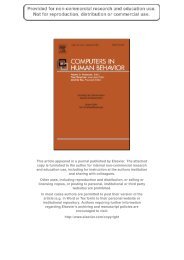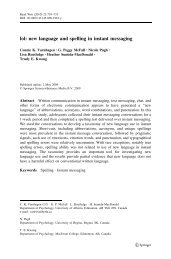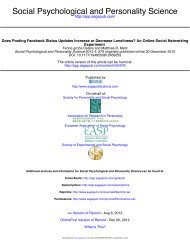Six Models for the Internet + Politics
You also want an ePaper? Increase the reach of your titles
YUMPU automatically turns print PDFs into web optimized ePapers that Google loves.
Archon Fung, Hollie Russon Gilman, and Jennifer Shkabatur 39<br />
FIG 5. Truth-Based Advocacy<br />
Our examples of ICT models of truth-based advocacy work ostensibly as traditional<br />
news outlets through a new medium. However, <strong>the</strong>se truth-based advocacy<br />
groups do circumvent traditional media outlets through using technology in new<br />
and innovative ways (Benkler 2011) both on <strong>the</strong> end of user interaction as well<br />
as in<strong>for</strong>mation aggregation.<br />
In<strong>for</strong>mation in truth-based advocacy ef<strong>for</strong>ts typically flows through both traditional<br />
news outlets as well as through new media plat<strong>for</strong>ms. These truths can<br />
thus reach traditional media users as well as new audiences. They exert communicative<br />
pressure on existing governmental institutions. However, <strong>the</strong> impact of<br />
this aggregate pressure is incremental, not revolutionary, as <strong>the</strong>se government<br />
institutions are intrinsically slow and resistant to change. These plat<strong>for</strong>ms are<br />
able to be effective in so far as <strong>the</strong>y are viewed as noncorrupt, honest, and reliable<br />
indicators of in<strong>for</strong>mation in an environment where in<strong>for</strong>mation is perceived<br />
as tainted as a result of corrupt government. Truth-based advocacy organizations<br />
are essential because it is never clear which in<strong>for</strong>mation will be honest or disclosed;<br />
<strong>the</strong>re<strong>for</strong>e, all in<strong>for</strong>mation becomes potentially tainted. This fear of nontransparency<br />
may help illustrate <strong>the</strong> large splash made by Wikileaks, which<br />
confirmed some existing suspicions surrounding a culture of lack of disclosure<br />
in politics.<br />
Consider three real-world examples of truth-based advocacy from low- and<br />
middle-income countries.<br />
Founded by Vivek Gilani in 2004, Mumbai Votes 17 attempts to address systematic<br />
flaws in <strong>the</strong> way citizens relate to <strong>the</strong> democratic process in India. Some<br />
Mumbai politicians are known to pay off slumlords to ensure that an entire<br />
neighborhood supports a candidate. There is fur<strong>the</strong>r corruption in “paid news”,<br />
whereby advertisements are cleverly embedded within news reports, rendering<br />
many news stories illegitimate. Mumbai Votes aims to contribute to <strong>the</strong> quality of<br />
political representation in two ways. First, it addresses <strong>the</strong> lack of in<strong>for</strong>mation<br />
available to voters about <strong>the</strong> quality and history of candidates. Second, Mumbai<br />
Votes keeps citizens in<strong>for</strong>med of what <strong>the</strong>ir officials are doing after <strong>the</strong>y are<br />
elected into office. The organization presents this in<strong>for</strong>mation in ways that are<br />
easily digestible by average citizens. With <strong>the</strong> help of students, Mumbai Votes<br />
aggregates large amounts of in<strong>for</strong>mation, makes it presentable, and puts it in<br />
context. Through presenting <strong>the</strong> aggregated in<strong>for</strong>mation in a comprehensive<br />
and easily accessible way, Mumbai Votes uses its ICT plat<strong>for</strong>m to enable users to<br />
receive in<strong>for</strong>mation in a credible and reliable way.<br />
17 http://mumbaivotes.com/.
















